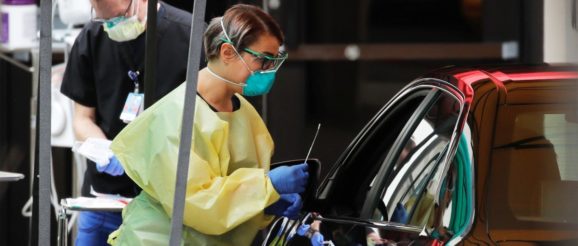Coronavirus Outbreak & Big Government: Innovation Helps in Uncertain Times | National Review

Bernie Sanders and his supporters are trying to use the coronavirus pandemic as an argument for socialized medicine — but the truth is, that’s the wrong way to look at it.
It’s common, of course, for big-government liberals to argue that the mere existence of a problem equals a need for greater government involvement. This is a logical fallacy in many cases, and a lot of evidence suggests that this may be one of them.
First of all, remember this: Italy has a single-payer health-care system, and the coronavirus has been a disaster there all the same. In fact, Italy has reported the largest 24-hour death toll of any country during the pandemic so far — including China. If it were true that dealing with this virus was as simple as socialized medicine, then that wouldn’t be the case.
Furthermore, there’s also the issue of the way that existing government regulations have, in some cases, actually made things worse here in the United States.
For example: The FDA has only recently allowed states to create their own labs for designing coronavirus tests, and announced that two private companies (Hologic and LabCorp) had received approval to manufacture and distribute them. Again, this happened only recently (on Monday) even though there has been, for a while now, largely a consensus that a shortage of these tests has been a major factor in creating the disastrous situation we are in now.
It’s good that this has finally happened, but it should have happened sooner — and it would have, if it weren’t for the government. After all, it’s not like private entities hadn’t been trying. According to a piece in the New York Times from last week, an infectious-disease expert in Seattle, Helen Y. Chu, had been trying to get the government to allow her to test for the coronavirus since January.
In February, she decided she couldn’t wait any longer and did it anyway — and quickly found a positive test for a local teenager who hadn’t traveled anywhere, clear evidence of community spread. Even though she had broken the rules, she did what she felt was the right thing and informed local health officials about her discovery. In response, the federal government told her to stop testing immediately, which allowed the situation to get worse when it could have been getting better.
What’s more, it wasn’t until Friday that the Food and Drug Administration approved the use of a testing system developed by Roche Molecular Systems. The test is ten times faster than the one that health-care providers had been previously using. To the FDA’s credit, the approval was made “within 24 hours of receiving the application,” CNN’s Jake Tapper reports. This is obviously far better than the long delays we’ve seen in other instances, but I still can’t help wondering why this kind of approval was even necessary at all — after all, former FDA chief Scott Gottlieb has noted that it uses “fairly routine technology.”
Worse, the problems that have been created by the government aren’t limited to testing restrictions, either. How many times, for example, have you heard about the hand-sanitizer shortage? It’s been in the news for quite some time, and yet it wasn’t until Saturday that government officials announced that they would not punish pharmacists for making their own alcohol-based hand sanitizer. Yes, pharmacists — as in, you know, the people whose entire careers prepare them to know how to do things that are far more complicated in this arena, who quite obviously should have had this right all along. (Oh, and speaking of hand sanitizer: As Reason’s Nick Gillespie notes, the TSA has also only recently allowed family-size bottles of it on airplanes. How much healthier could we be, how much safer from all infectious illnesses, if the government hadn’t insisted on instituting this useless security theater in the first place?)
Even the state of Massachusetts — home of Senator Elizabeth Warren, hardly known for its lax regulations — has decided to loosen one of its own laws by temporarily allowing medical professionals from other states to practice there. This is, as Cato’s Walter Olson notes, not only a good idea but also “one of many good ideas that should be kept on as policy after the pandemic emergency passes.”
I could never, for the life of me, understand how often the people who clamor for tighter restrictions on speech are the same ones who also cry that President Trump is a racist, sexist, modern-day Hitler. They want to give the government more control over what they can and cannot say, even though they think that the leader of its executive branch is a monster; how does that make sense? It’s the same thing here: In many cases, it’s the people shouting that the government has handled this crisis with incompetence who are also shouting that the same government should be more involved going forward.
It’s not that the government should be doing nothing, of course, but I think it’s important to also highlight the instances in which its “help” with combating this virus has come in the form of its getting out of the way. I also want to recognize all of the work that civilians and private companies have been doing to try to solve this issue independent of the state. Just yesterday, for example, billionaire entrepreneur Elon Musk suggested looking into a research study exploring the potential use of chloroquine, which has been used to fight malaria, in treating the new coronavirus. Seeing these sorts of efforts brings me comfort, because the truth is, no government could ever expect to solve this sort of problem on its own. (Full disclosure: One of the coauthors of the aforementioned study, James Todaro, is my father’s friend’s son.)
